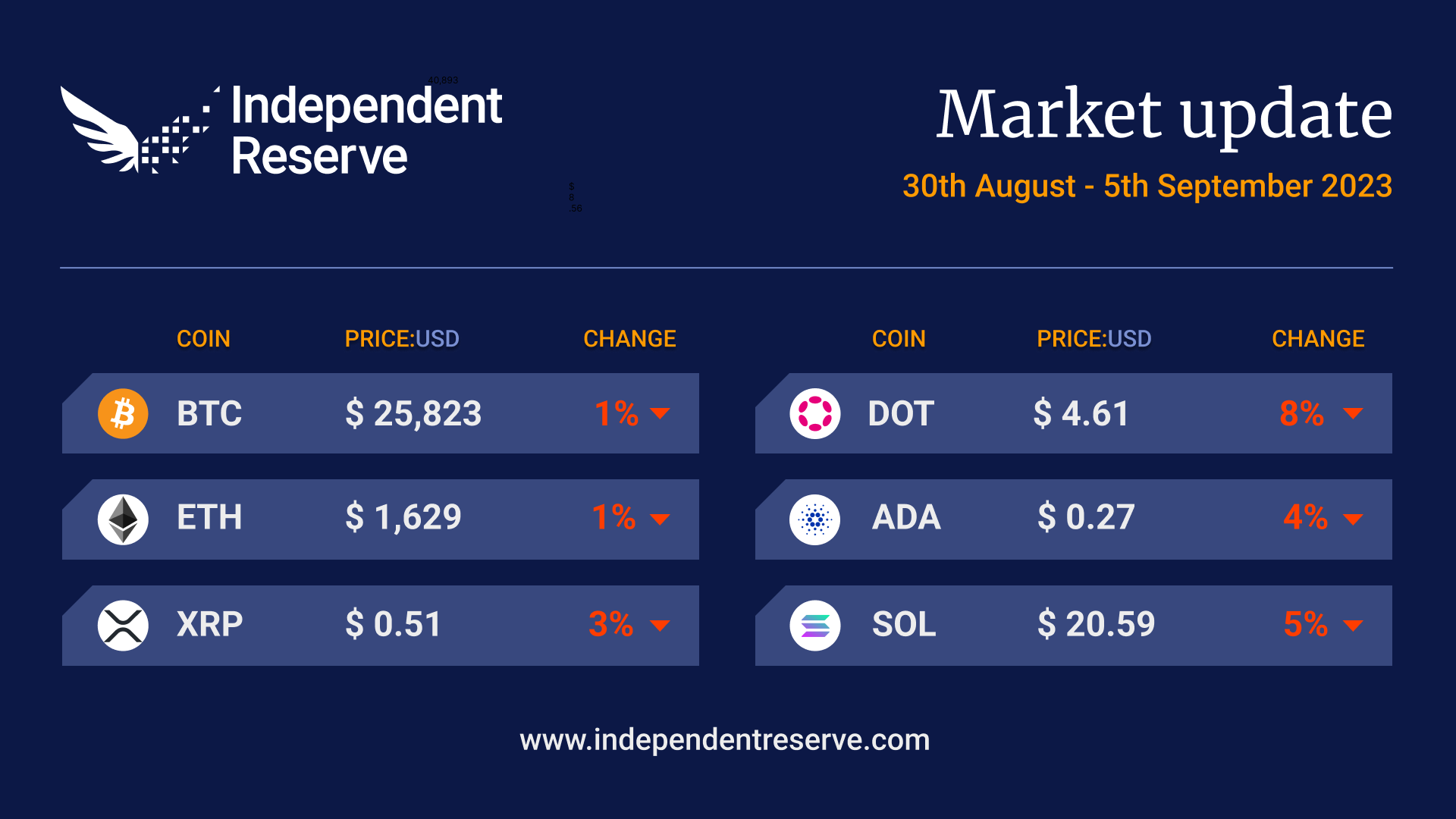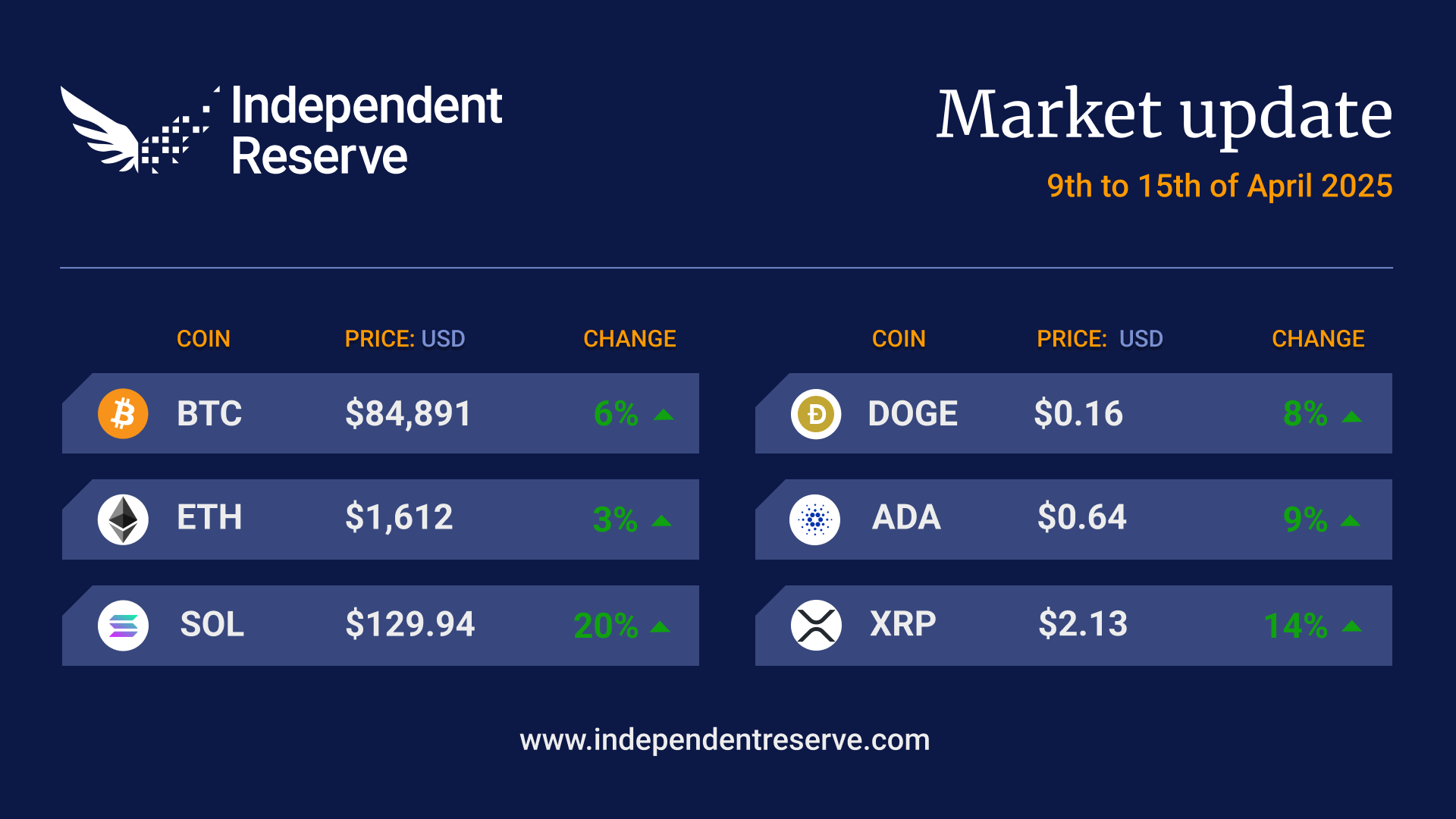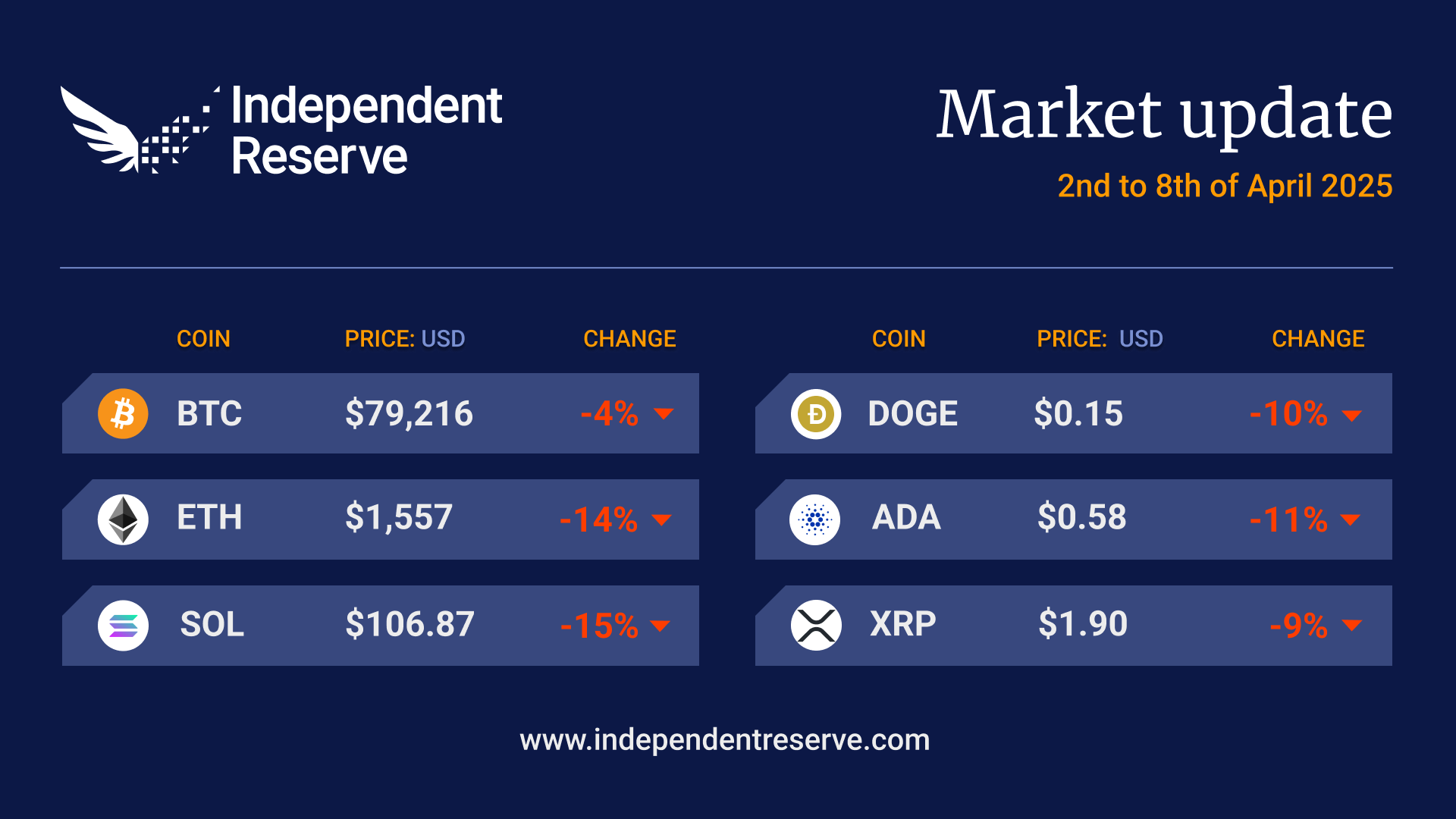In Markets
Despite a short-lived sugar rush from Grayscale’s court victory against the Securities and Exchange Commission, crypto markets remain in a holding pattern and are looking for a direction. Bitcoin finishes the week at A$40,035 (US$25,800) on our Bitcoin exchange, which is essentially the same as seven days ago. Ethereum also treads water this week and ends up at A$2,519 (US$1,629). XRP (-3%), Cardano (-4%), Dogecoin (1.2%) and Solana (-5%) also barely moved. The Fear and Greed Index is at 40 or Fear.

From the OTC desk
Risk assets, including digital assets, have been quiet this week, following the end of the US/European holiday period. Historically, market sentiment becomes outlined post the US Labour Day holiday, when workers ‘return to the office’. For the time being, we watch and wait, as new capital allocations/reallocations shortly begin. Critical to the cryptocurrency complex will be any update on the progression of a US spot BTC ETF. Last week, the only material ‘pop’ in volatility was post the Grayscale vs SEC court ruling. The SEC has until the 14th of October to respond to the ruling – any announcement will be critical to BTC, and in turn, the cryptocurrency complex.
In China, concerns of a weaker economic landscape have halted (although time will tell for how long). Chinese property stocks have surged on the back of policy support, mainly targeting access to credit for the first home buyer in the big four cities. While not the ‘bazooka’ many market commentators have been waiting for, the targeted (piecemeal) approach to expansionary credit policy has been well received.
China will announce the details of its trade balance for August on Thursday at 1:00pm AEST. The China inflation rate for August will be released on Saturday at 11:30am. Global bond markets will remain attentive to any announcement of ongoing deflation in China, while the trade balance may prove an important economic event for the AUD/USD.
Today, the Reserve Bank of Australia (RBA) met for the September monetary policy meeting. This is the last meeting chaired by Governor Philip Lowe, concluding an amazing career with the RBA. As widely expected, the RBA has held the current cash rate at 4.10%. Today’s Statement highlights:
In the US, mortgage rates have remained above 7% for the fifth week in a row – the first time since 2002. This has been despite the two-year treasury yield falling below 5%, to trade at circa 4.90%. Last week’s critical US employment series highlighted an increase in the labour market participation rate, causing the unemployment rate to increase from 3.5% to 3.8%. On the headline, an additional 187k jobs were created – above the market expectation of a 170k increase. Average hourly earnings (YoY, August) remained buoyant at 4.3%, versus 4.4% in July. Wage inflation and the unemployment rate remain critical to the Federal Open Market Committee’s decision-making.
On the OTC desk, public holidays in Singapore (Friday) and the US (Monday) have made for quite a chaotic week. The lack of market participation on public holidays (in general) reduces liquidity and fx trading capability, increasing the time for USD settlements. Despite these structural challenges brought about through trad-fi, we have remained incredibly active. Selling USDT and USDC back to USD and AUD remains quite a structural flow. Interestingly, this week has seen a large volume of BTC buying, despite (or maybe because of) softening price action. Alts trading remains light for the time being.
For any further information, please feel free to reach out.
In headlines
Bitcoin’s sideways action doesn’t mean the price isn’t edging further downwards, with the cryptocurrency shedding 10% of its value in August. Unfortunately, September has historically been a terrible month for Bitcoin prices, with the orange one increasing in value over the course of the month in just two years in the past decade. The past six Septembers in a row have seen prices slide. Still, with an Ethereum Futures ETF a good chance of getting approved next month, and the tantalising prospect of a Bitcoin ETF getting the nod, there could be much better days ahead.
Grayscale: The best of times
It was the best of times, it was the worst of times. That’s how it felt this week after a judge ruled that the SEC had been “arbitrary and capricious” when it rejected Grayscale’s application to convert its Bitcoin Trust into a spot Bitcoin ETF. Judge Neomi Rao vacated the SEC’s order to deny the listing and granted Grayscale’s petition for review. The judge rejected the SEC’s argument that Bitcoin market manipulation means the spot ETF should not proceed, not least because the SEC already approved a Bitcoin Futures ETF and spot and futures markets are 99% correlated. The decision does not force the SEC to approve a Bitcoin ETF, however. One option that was raised in court, would be for the SEC to retroactively deny the ETF Futures application. However, JP Morgan analyst Nikolaos Panigirtzoglou said this is unlikely: “Such a move would be very disruptive and embarrassing for the SEC.” The Wall Street Journal ran a delightfully scathing editorial, writing that “Chairman Gary Gensler’s SEC whiffs again…arbitrary regulation and regulatory overreaches are recurring themes of the Gensler SEC and the Biden Administration. Is he trying to match Lina Khan’s losing record at the Federal Trade Commission?”
Grayscale: The worst of times.
Bitcoin surged to a two-week high of around A$43,200 (US$27.9K) in the aftermath of the ruling, only to entirely erase the gains within 24 hours after the news came through that Bitcoin ETF applications from BlackRock, WisdomTree, VanEck, Bitwise, Valkyrie, Fidelity and Invesco/ Galaxy, had all been delayed by the SEC. The delays were widely expected, so the price response is interesting. The big picture is all rosy, however, with the decision massively increasing the chances an ETF will be approved. Former SEC chair Jay Clayton, who preceded Gary Gensler in the role, said “an approval is inevitable” because “the dichotomy between a futures product and cash product can’t go on forever.” Bloomberg ETF analysts Eric Balchunas and James Seyffart raised the chance of a Bitcoin ETF approval this year to 75% – and have it at 95% by the end of 2024. “The judges unanimously repudiated the SEC’s arguments, and the agency will struggle to justify further denials as it faces deadlines,” Syffart said. The next deadline for approval is October 7, but the SEC can drag the current application process out until early next year.
Uniswap court victory bodes well
United States District Court Judge Katherine Failla has dismissed a class action lawsuit by Uniswap users who sued after losing money to scam tokens on the protocol. The interesting bit is that Judge Failla exhibited a good deal of crypto knowledge in her judgement, parsing the legal differences between centralised and decentralised exchanges, and sheeting home the blame for scam tokens to the issuers that wrote the code and provided liquidity. Failla also referred to Ethereum as a commodity, and she said she wasn’t going to make novel interpretations of securities laws. “The Court declines to stretch the federal securities laws to cover the conduct alleged, and concludes that Plaintiffs’ concerns are better addressed to Congress than to this Court,” she wrote. This is significant because Judge Failla will also be hearing the SEC’s case against Coinbase for selling illegal securities. The SEC’s action in that case has been criticised for contravening the major questions doctrine – which holds that Congress and not agencies like the SEC, should decide on important laws and regulations.
Stakes are too high
Ethereum staking pools Rocket Pool, StakeWise, Stader Labs and Diva Staking have all committed to self-limiting their pools to below 22% of Ethereum validators. Beacon chain community ‘health consultant’ Superphiz proposed the idea back in May 2022, and said the reason for the limit was that 66% of validators need to agree on the state of Ethereum, meaning that if pools are limited to 22%, at least four staking pools would need to collude in order to do anything dodgy. Unfortunately, Lido, which has one-third of all validators (32.4%), has so far refused to agree to self-limit. However, it should be pointed out that it’s pretty easy for Rocket Pool, StakeWise, Stader Labs and Diva Staking to commit to a 22% limit, as they are in no danger of hitting it. The next biggest staking pool to Lido is Coinbase which only has 8.7%.

Until next week, Happy Trading!


